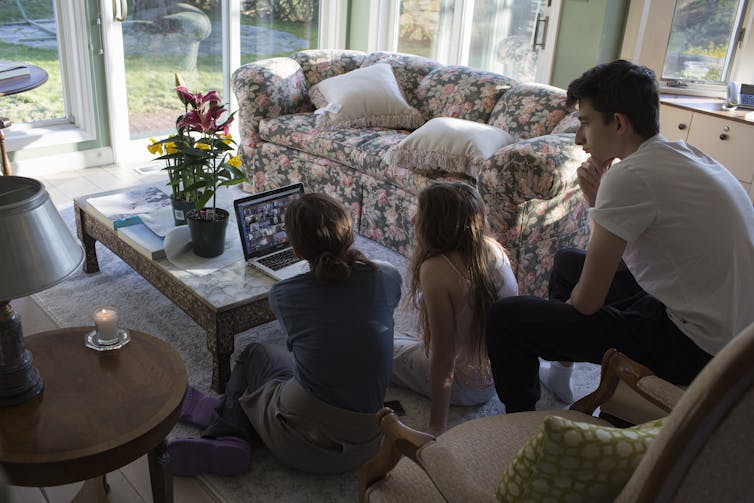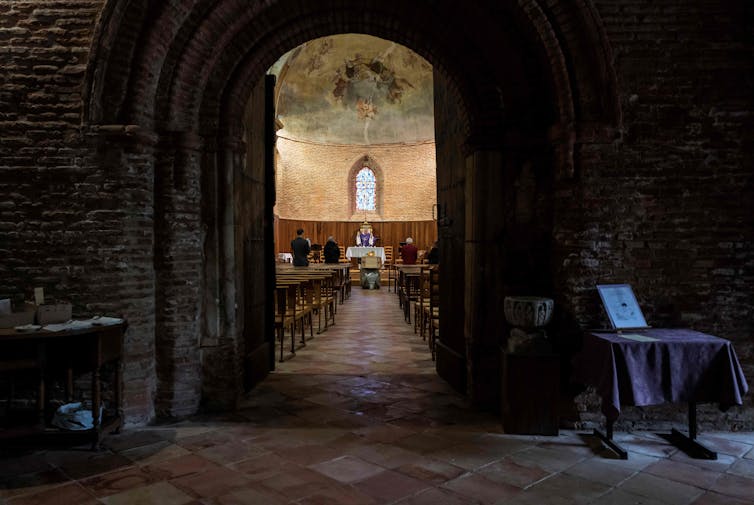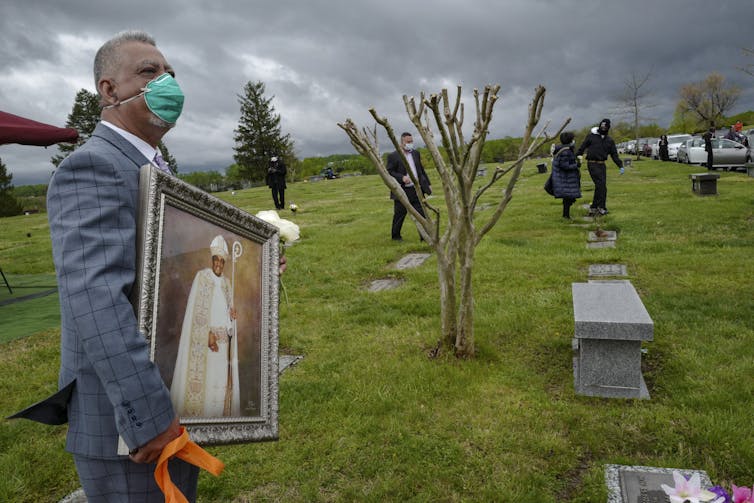Different faiths, same pain: How to grieve a death in the coronavirus pandemic
- Written by David A. Schuck, Lecturer, the Rabbinical School, Jewish Theological Seminary
Editor’s note: Every religion has its death rites, communal practices developed over millennia to honor the dead and console the living. Some of these rituals are unique to one faith, but more are shared – a reminder there’s a common path toward healing. Yet COVID-19 is forcing many people to grieve in isolation. We asked three faith leaders and religion scholars for their counsel on mourning during the pandemic.
Honoring the dead and comforting mourners
Rabbi David A. Schuck
Jewish mourning rituals[1] follow the principles of “k’vod hamet,” honoring the deceased, and “nichum aveilim,” comforting mourners.
K’vod hamet includes sitting and praying with the body, ritual washing and burial within two days of death. At a Jewish funeral, family and friends take turns filling the grave with earth – a final act of love. Focus then turns to the family, who return to their home to observe shiva[2], seven days of intense mourning in which the community provides meals, prayer and comfort.
With these communal rituals inaccessible during the coronavirus pandemic, the trauma of losing loved ones is profound. For synagogues in the center of this pandemic[3], there’s collective trauma, too. I live in New York, and each week my congregants receive several death notices of longtime friends, but have no avenue to grieve together.
I’m broadcasting funerals online and coordinating shiva visits through Zoom[4], but technology[5] will never approximate the comfort of a home full of people. During shiva, our community holds us in our grief until we discover ways to move forward alone again.
 A family sits for a remote Zoom shiva, the traditional Jewish time of mourning, New Canaan, Connecticut, April 11, 2020.
Andrew Lichtenstein/Corbis via Getty Images[6]
A family sits for a remote Zoom shiva, the traditional Jewish time of mourning, New Canaan, Connecticut, April 11, 2020.
Andrew Lichtenstein/Corbis via Getty Images[6]
The first funeral I officiated during the coronavirus pandemic was for a woman who would have wanted blaring trumpets to announce her death and throngs of admirers to come pay tribute. Instead, four people bid her farewell. As I grabbed earth with my fingers and dropped it onto her casket, I whispered an apology for how the world stole the dignity of her final moments.
Finding solace in the psalms of lament
Prof. Gina Hens-Piazza
In normal circumstances, the death of a loved one taxes the heart and mind with a paralyzing numbness. And, in normal circumstances, the traditional rituals of the Catholic faith[7] – the vigil, funeral mass and graveside committal service – give mourners an occasion to honor the memory of the deceased and provide comfort.
A pandemic is not normal circumstances. The absence of these traditional practices compounds the rawness of grief.
In a recent interview with the American Catholic magazine Commonweal[8], Pope Francis suggested that this is a time “for inventing, for creativity” within the Church, urging Christians to find new ways to express their faith during lockdown.
 A necessarily small funeral at a church outside Toulouse, France, during the coronavirus lockdown, April 2020.
Lionel Bonaventure/AFP via Getty Images[9]
A necessarily small funeral at a church outside Toulouse, France, during the coronavirus lockdown, April 2020.
Lionel Bonaventure/AFP via Getty Images[9]
I find examples of this creativity in how U.S. Catholic communities are using technology to accommodate gatherings of friends and family for consoling prayer, recitation of the rosary, online memorials and notes of remembrance. Some Catholic parishes have developed ministries of listening and consolation[10], with volunteers calling the bereaved or visiting online to offer support.
People are also commemorating their dead loved ones at home, lighting candles in their memory or playing their favorite hymns.
And while memorial liturgies have been postponed, families may find some comforting expressions of loss more immediately in biblical texts. The “psalms of lament[11]” – especially Psalms 91, 121 and 130 – are prayers for help in surviving times of great pain. Such recitations provide words to narrate a pain and suffering so devastating it seems to eclipse words.
Healing begins after the homegoing
The Rev. Dr. Rodney Sadler Jr.
For African Americans of the Baptist faith, death is a communal experience. It is in this coming together of family and friends and associates and neighbors that the healing begins.
As the Rev. Dr. Peter Wherry writes in his book “Preaching Funerals[12],” black Baptists often call funerals “homegoing services,” denoting the fact that the believer once transitioning is in a better state than when here…they have “gone home to live with [the] Lord.”
When someone transitions, despite the clear suffering attendant to a loss, we celebrate their life. This occasions sayings like “trouble don’t last always,” or “we will see X again.”
Though well worn, these cliches seek to comfort the mourning that their loved one is not really dead, but lives on with God.
Since homegoing services can bring together family from across the world[13], they usually take place a week or more after death to ensure everyone may participate. There is typically a viewing for people to pay their last respects before the service, and afterwards there is usually a parade to the cemetery. Burial comes with its own mini-service.
 Mourners after the funeral of the Baptist pastor James Flowers, a victim of COVID-19, at a cemetery in Landover, Maryland, April 13, 2020.
Michael Robinson Chavez/The Washington Post via Getty Images[14]
Mourners after the funeral of the Baptist pastor James Flowers, a victim of COVID-19, at a cemetery in Landover, Maryland, April 13, 2020.
Michael Robinson Chavez/The Washington Post via Getty Images[14]
Following that is the repast – a meal expected to feed the guests and to allow for fellowship, storytelling, reuniting with distant loved ones and meeting those known only by name. This, though quite reverent, is also festive. It facilitates the resolution needed to progress after a loss.
I have presided at many such services, though not during the coronavirus pandemic. One piece of advice I would offer to those who mourn now is this: In the coming months, stay in close contact with those who also mourn. Call someone whenever you feel longing for the departed – share a sorrow, a song, a funny anecdote or a recollection of their quirks.
Share your grief. When you feel the urge to cry, let it out. Emotions are best handled not with reason, but by allowing yourself the freedom to feel them fully. And remember, the nadir of your grief is not a curse – it is an indication of how deeply you loved.

References
- ^ Jewish mourning rituals (www.haaretz.com)
- ^ observe shiva (www.myjewishlearning.com)
- ^ center of this pandemic (www.haaretz.com)
- ^ shiva visits through Zoom (www.wbur.org)
- ^ technology (theconversation.com)
- ^ Andrew Lichtenstein/Corbis via Getty Images (www.gettyimages.com)
- ^ traditional rituals of the Catholic faith (ccapgh.org)
- ^ recent interview with the American Catholic magazine Commonweal (www.commonwealmagazine.org)
- ^ Lionel Bonaventure/AFP via Getty Images (www.gettyimages.com)
- ^ developed ministries of listening and consolation (www.saintfrancisborgia.org)
- ^ psalms of lament (www.franciscanmedia.org)
- ^ writes in his book “Preaching Funerals (www.judsonpress.com)
- ^ bring together family from across the world (www.theatlantic.com)
- ^ Michael Robinson Chavez/The Washington Post via Getty Images (www.gettyimages.com)
Authors: David A. Schuck, Lecturer, the Rabbinical School, Jewish Theological Seminary

